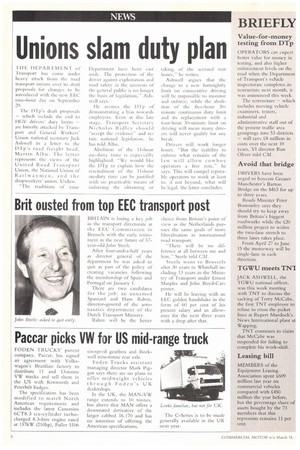Unions slam duty plan
Page 6

If you've noticed an error in this article please click here to report it so we can fix it.
THE DEPARTMENT of Transport has come under heavy attack from the road transport unions over its draft proposals for changes to be introduced with the new EEC nine-hour day on September 29.
The DTp's draft proposals which include the end to I-RN drivers' duty limits are bitterly attacked by Transport and General Workers' Union national secretary Jack Ashwell in a letter to the DTp's road freight head, Martin Albu. 'Else letter represents the views of the United Road Transport Union, the National Union of Railwaymen, and the shopworkers' union, Usdaw.
"The traditions of your
Department have been cast aside. The protection or the driver against exploitation and road safety Us the interests of the general public is no longer the basis of legislation," Ashwell says.
He accuses the Dip of demonstrating a bias towards employers. Even at this late stage. Transport Secretary Nicholas Ridley should "accept the evidence" and retain national legislation, he has told Albu.
Abolition of the 11-hour on-duty time is especially highlighted. "We would like the DTp to explain how the rescindment of the 11-hour on-duty time can be justified with no practicable means of enforcing the obtaining or
taking of the accrued rest hours.he writes.
Ashwell argues that the change to a new fortnightly limit on consecutive driving will be impossible to monitor and enforce, while the abolition of the five-hour 30minute continuous duty limit and its replacement with ,) four-hour 30-minute limit on driving will mean many drivers will never qualify for any break.
Drivers will work longer hours. ''But the inability to enforce what remains of the law will allow cowboy operators a free rein." he says. This will compel reputable operators Co work at least to, if not beyond, what will be legal. the letter concludes.




















































